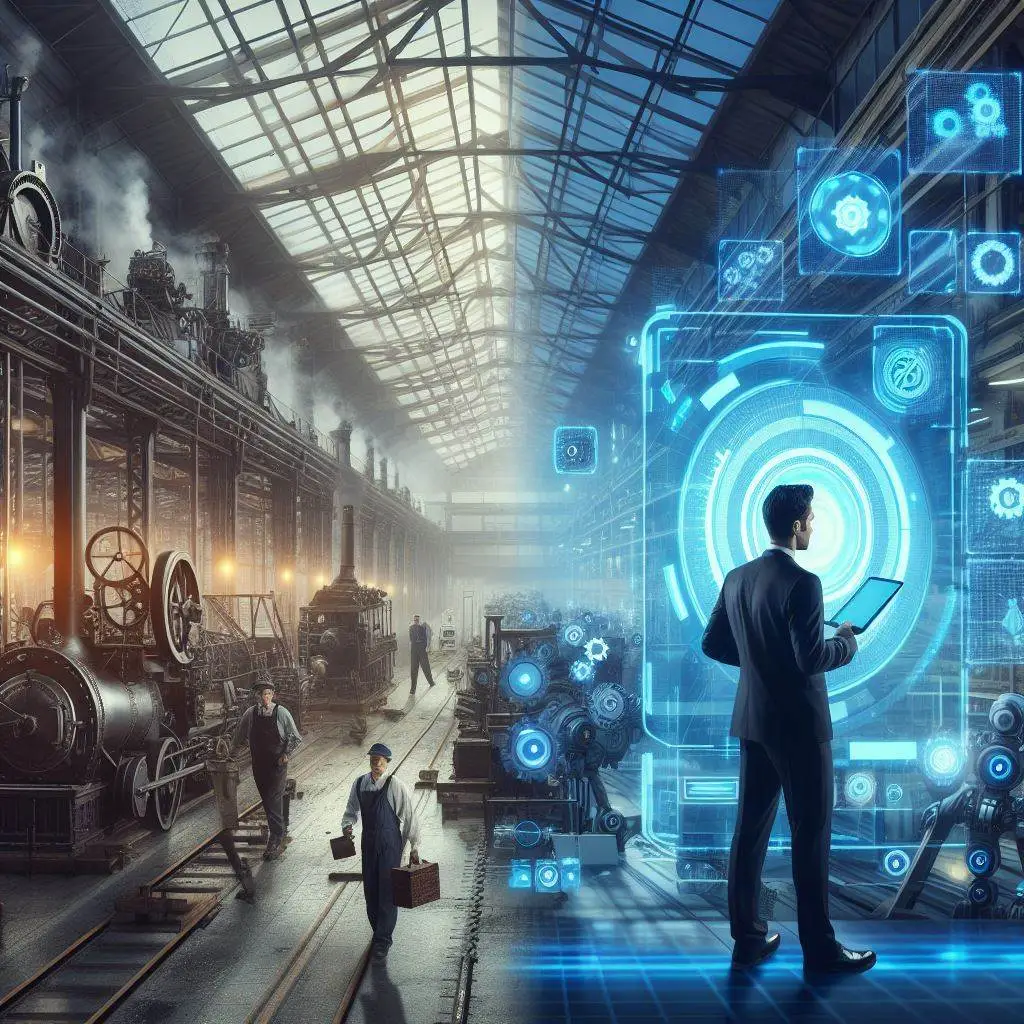Steam Power: Industrial Engineering\’s Roots in the Industrial Revolution
The story of industrial engineering begins alongside the thundering roar of the Industrial Revolution. As factories replaced workshops and steam power revolutionized manufacturing, a new breed of thinkers emerged. These individuals, fascinated by the intricate dance of machines and manpower, sought to optimize production processes and elevate efficiency.
The Father of Scientific Management: Frederick Winslow Taylor and the Efficiency Experts
Enter Frederick Winslow Taylor, often called the \”Father of Scientific Management.\”A mechanical engineer turned management consultant, Taylor believed in applying scientific principles to analyze and redesign work tasks. Through his time-and-motion studies, Taylor aimed to identify the most efficient way to perform specific jobs, breaking them down into smaller, more manageable components.
Beyond Time and Motion: The Gilbreths and Human Factors
While Taylor\’s approach focused on maximizing output, husband-and-wife team Frank and Lillian Gilbreth recognized the importance of the human element in industrial engineering. Frank Gilbreth, known as the \”Father of Time and Motion Study,\” further refined Taylor\’s methods by incorporating detailed analysis of worker movements. Lillian Gilbreth, a psychologist, championed the concept of human factors, emphasizing the need to design workplaces and tools that accommodated human capabilities and limitations.
From Assembly Lines to Automation: The Rise of Mass Production
In the early 20th century we witnessed the rise of mass production, a concept that revolutionized manufacturing. Assembly lines, pioneered by Henry Ford in his iconic Model T production, exemplified the principles of industrial engineering. These meticulously planned production lines incorporated standardized parts, interchangeable components, and specialized labor, all overseen by the watchful eye of industrial engineers.
Beyond the Factory Floor: The Expanding Scope of Industrial Engineering
As the 20th century progressed, industrial engineering\’s reach extended beyond the factory floor. Industrial engineers began applying their expertise to a wider range of industries, including logistics, healthcare, and service sectors. The focus shifted from optimizing production lines to streamlining processes, managing complex systems, and ensuring quality control across diverse operations.
The Digital Revolution: Industrial Engineering Embraces the Power of Technology
The latter half of the 20th century ushered in the digital revolution, and industrial engineering was poised to embrace this transformative change. The rise of computers and information technology provided powerful tools for data analysis, simulation modeling, and system optimization. Industrial engineers began leveraging these technologies to design more efficient layouts, manage supply chains more precisely, and improve quality control through statistical methods.
A New Era: Industrial Engineering and the Future of Manufacturing
Today, industrial engineering stands at the forefront of a rapidly evolving industrial landscape. Technological advancements like artificial intelligence, robotics, and additive manufacturing are blurring the lines between traditional production methods and the future factories trial engineers are now tasked with integrating these disruptive technologies, optimizing complex production ecosystems, and ensuring future manufacturing processes\’ responsible and sustainable development.
A United Force: The Synergy of Industrial Engineering Disciplines
Throughout its history, industrial engineering has thrived on the synergy between its various disciplines. From the efficiency focus of Taylor to the human-centered approach of the Gilbreths, and from the optimization of mass production to the data-driven decision-making of the digital age, industrial engineering has constantly evolved by drawing upon a diverse toolkit.
A Legacy of Efficiency and Innovation: The Enduring Impact of Industrial Engineering
Industrial engineering\’s legacy is undeniable. Its principles have not only shaped the rise of modern manufacturing but have also permeated numerous industries. From the streamlined processes of modern hospitals to the efficient delivery networks of e-commerce giants, the influence of industrial engineering is evident throughout our daily lives.
Looking Forward: Industrial Engineering in a World of Change
As we stand on the precipice of a new industrial revolution, the future of industrial engineering is brimming with possibilities. The integration of advanced technologies like AI and automation will redefine production processes, demanding innovative approaches from industrial engineers. The focus will shift towards optimizing complex systems, ensuring human-machine collaboration, and maximizing sustainability in resource utilization and production practices.
Conclusion: A Bright Future for Industrial Engineering
Industrial engineering has come a long way since its humble beginnings in the factories of the Industrial Revolution. It has adapted to technological advancements, embraced new challenges, and constantly evolved its methodologies. As the world hurtles towards a future shaped by automation, AI, and a growing emphasis on sustainability, industrial engineering remains at the forefront. Its legacy of efficiency and innovation equips it to tackle the challenges of tomorrow, paving the way for a more efficient, sustainable, and prosperous future for generations to come.
This concluding sentence emphasizes the positive impact of industrial engineering on the future. Here are some additional points you can consider including:
Highlighting specific areas of future growth: Briefly mention exciting areas where industrial engineering will play a crucial role, such as:
- Designing smart factories with seamless human-machine interaction.
- Optimizing supply chains for efficiency and environmental sustainability.
- Utilizing big data analytics for predictive maintenance and improved decision-making.
- Encouraging future generations: Briefly mention the exciting career prospects for aspiring industrial engineers in this ever-evolving field.
Resources
- \”A Brief History of Industrial Engineering\” by Britannica: https://www.britannica.com/browse/Industrial-Engineering
- \”Industrial Engineering\” by The American Society of Mechanical Engineers (ASME): https://www.asme.org/
- \”Frederick Winslow Taylor\” by PBS: https://www.pbs.org/wgbh/theymadeamerica/whomade/taylor_hi.html
- \”The Father and Mother of Time and Motion Study\” by Smithsonian Magazine: https://www.business.com/articles/management-theory-of-frank-and-lillian-gilbreth/
- Generative AI: Steam Engine of the Fourth Industrial Revolution? > World Economic Forum Annual Meeting | World Economic Forum (weforum.org)



I’ve been following this blog for years and it’s amazing to see how much it has grown and evolved Congratulations on all your success!